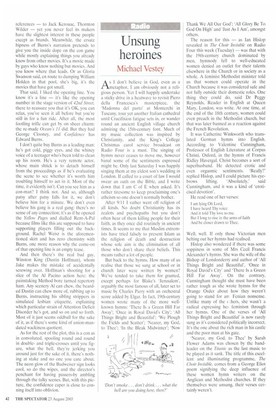Unsung heroines
Michael Vestey
AsmI don't believe in God, even as a etaphor, I am obviously not a religious person. Yet I will happily undertake a sticky drive in a heatwave to revisit Piero della Francesca's masterpiece, the 'Madonna del parto' at Monterchi in Tuscany, tour yet another Italian cathedral until Crucifixion fatigue sets in, or wander round an ancient English village church admiring the 15th-century font. Much of my music collection was inspired by Christianity, and the King's College Christmas carol service broadcast on Radio Four is a must. The singing of hymns never ceases to move me, however banal some of the sentiments expressed might be. Only last Saturday I was happily singing them at my eldest son's wedding in London. If called to a court of law 1 would swear an oath on the Bible, and I write down that I am C of E when asked. It's rather tiresome to keep proclaiming one's atheism so one doesn't normally bother.
After 9/11 I rather went off religion of all kinds. No doubt Christianity has its zealots and psychopaths but you don't often hear of them killing people for their faith, as they once did routinely in ancient times. It seems to me that Muslim extremists have tried falsely to present Islam as the religion of death and destruction whose sole aim is the elimination of all those who don't share their beliefs. This means rather a lot of people.
But back to the hymns. How many of us realise that those we sang at school or in church later were written by women? We've tended to take them for granted, except perhaps for Blake's 'Jerusalem', arguably the most famous of all, later set to music by Charles Parry with an orchestral score added by Elgar. In fact, 19th-century women wrote many of the more wellknown hymns: 'There Is a Green Hill Far Away'; 'Once in Royal David's City'; All Things Bright and Beautiful'; 'We Plough the Fields and Scatter'; 'Nearer, my God, to Thee'; 'In the Bleak Midwinter'; 'Now Thank We All Our God'; 'All Glory Be To God On High' and 'Just As I Am', amongst others.
The reason for this — as Ian Hislop revealed in The Choir Invisible on Radio Four this week (Tuesday) — was that with the 19th-century church dominated by men, hymnody fell to well-educated women denied an outlet for their talents elsewhere in the Church or in society as a whole. A feminist Methodist minister told us that women could operate in the Church because it was considered safe and not fully outside their domestic roles. One thing they could do, said Dr Peggy Reynolds. Reader in English at Queen Mary, London, was write, At one time, at the end of the 18th century, women could even preach in the Methodist church, but that was later banned as a reaction against the French Revolution.
It was Catherine Winkworth who translated German hymns into English. According to Valentine Cunningham, Professor of English Literature at Corpus Christi, Oxford, in the hymns of Francis Ridley Havergal. Christ becomes a sort of superhusband. He detected erotic and even orgasmic sentiments. 'Really?' replied Hislop, and I could picture his eye
brows lifting. 'Absolutely,' said Cunningham, and it was a kind of -eroticised devotion'.
He read one of her verses:
I am lying Oh Lord,
I have heard Thy voice And it told Thy love to me.
But I long to rise in the arms of faith And he closer drawn to Thee.
Well, well. If only those Victorian men belting out her hymns had realised, Hislop also wondered if there was some soppiness in some of Mrs Cecil Francis Alexander's hymns. She was the wife of the Bishop of Londonderry and author of 'All Things Bright and Beautiful', 'Once in Royal David's City' and 'There Is a Green Hill Far Away'. On the contrary, Cunningham thought she must have been rather tough as she wrote hymns for the Orange Order about how they weren't going to stand for an' Fenian nonsense. Unlike many of the t. _hers, she wasn't a radical expressing hei feminism through her hymns. One of the verses of 'All Things Bright and Beautiful' is now rarely sung as it's considered politically incorrect. It's the one about the rich man in his castle and the poor man at his gate.
'Nearer, my God, to Thee' by Sarah Flower Adams was chosen by the bandleader on the Titanic as the last music to be played as it sank. The title of this excellent and illuminating programme, The Choir Invisible, comes from a George Eliot poem signifying the deep influence of these women hymn writers on the Anglican and Methodist churches. If they themselves were unsung, their verses certainly weren't.


























































 Previous page
Previous page